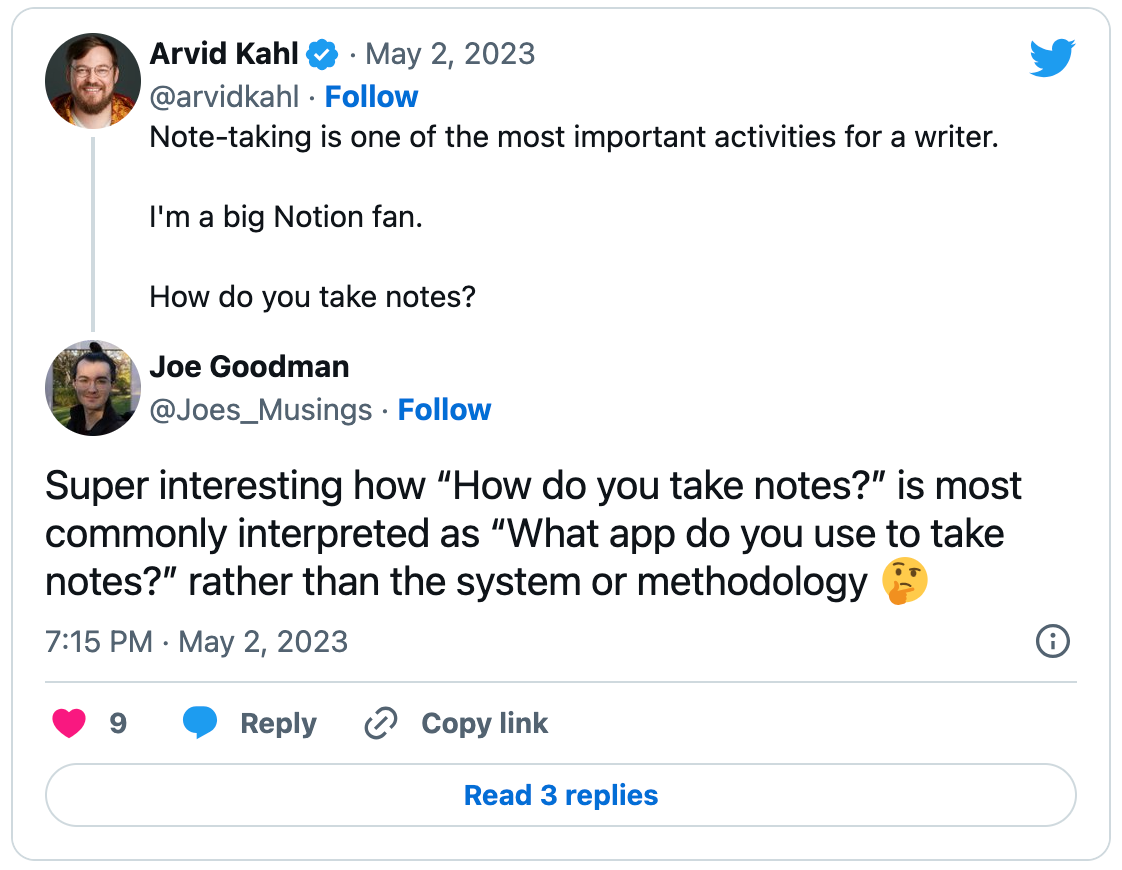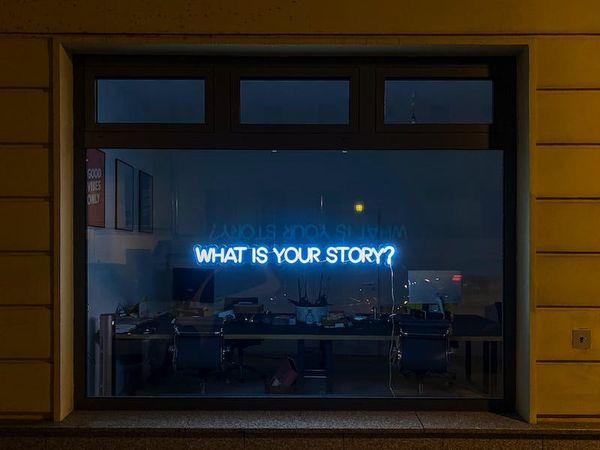What good is technology?
Digging below the facade of new tech

This week:
- Musings: What good is technology?
- Questions: Note taking
- Resources: Andy Matuschak
- Personal Updates: Killed my internet?!
What good is technology?
This week, Apple announced their $3,500 AR headset. Between some moments that personally felt quite sad and dystopic, I was mostly wondering:
"What is it actually good for?"
I'm sure it'll be a fantastic entertainment device, allowing us to further immerse in content and make escaping easier. But what about when it comes to work?
There'll be convenience behind bringing a few 4k monitors with you to the coffee shop or sofa, but I'm assuming it's going to be some time before we'll see outsized benefits for most people.
Despite that, we're still going to see a mad dash for it. We'll see the early adopters and tech YouTubers we admire posting their reviews come next year, and the mimetic desire will start. We'll imagine a world in which we're able to be more productive, be more entertained, and capture more realistic memories.
Our default wiring says more = better.
Don't get me wrong, I absolutely love new technology. But as I've started to read and listen to more Cal Newport, Dr. K, and the likes, I've begun to re-evaluate my interactions with technology.
Technology is a tool
New products, new apps, new tools, they won't inherently make us more productive. They're facades covering the real core of getting things done.
A new MacBook Pro may shave off 15 minutes of video rendering time, but it won't curb your daily hour long Twitter binge. A Kindle Scribe will make note taking and highlighting your Kindle books seamless, but won't help with the fact that you don't do anything with them.
Yet, this is the focus of most content you'll find online.

You'll find an endless supply of channels dedicated to reviewing and showcasing the newest mediums, apps, and feature subsets proving why the current tool you're using isn't good enough.
Unfortunately that type of content is the easiest to produce and gets the most clicks, instilling the fear of missing out upon unsuspecting scrollers.
Sticking with the note taking example, this part of Andy Matuschak’s notes really stuck out to me:
The vast majority of that writing fixates on a myopic, “lifehacking”-type frame, focused on answering questions like: “how should I organize my notes?”, “what kind of journal should I use?”, “how can I make it easy to capture snippets of things I read?”, etc.
Answers to these questions are unsatisfying because the questions are focused on the wrong thing. The goal is not to take notes—the goal is to think effectively. Better questions are “what practices can help me reliably develop insights over time?”, “how can I shepherd my attention effectively?” etc.
Am I doing any better sitting on my high horse yelling into the void about how "technology bad," shaking my fist at consumerism, while not providing any solutions for what's at the core? Not at all. (But hopefully we'll get there someday soon!)
Speaking of, what is at that core?
The systems underneath
If technology is a facade, systems lie underneath.
Am I interested in what type of pen Neil Gaiman uses? Absolutely. But if I could dive into his brain and understand anything, I'd love to know his process, his systems of creativity, and how he's able to turn ideas into published works.
When it comes to technology use, there's this core aspect of intentionality that we're missing.
Personally, that intentionality is a constant work in progress, especially as I’ve been totally revamping my current systems.
When it comes to note taking and personal knowledge management, I’ve focused most on a Smart Notes/Zettelkasten hodgepodge within Obsidian. However, recently I’ve felt that a lot of my older notes just haven’t been useful, and I have a “ToProcess” inbox that keeps growing.
(Don’t ask me what my personal “productivity” system in Notion looks like right now, I don’t want to talk about it.)
I chose those apps, and I'm sticking with them for the time being as I'm working on building out the systems within them. If I build the major system that I enjoy using, but am feeling the constraints of the app, I'd then consider switching to another.
Parting thoughts
Remember that technology is a tool, and keep these top of mind:
- What is it in service of?
- How is it making my life better?
- In what ways am I interacting with it that's pulling me away from my goals?
As I develop my systems, I'll be sure to share them here!
Questions
I’ve been thinking more about note taking this week, and would love to hear from you:
How do you take notes? How do you turn those notes into action, behavior change, or content to share?
Resources
I quoted Andy Matuschak above, whose notes on note-writing systems I’ve been diving into recently. I really love his public notes, and will build something similar someday soon!
His notes on, well, notes, is inspired by the whole Smart Notes and Zettelkasten ideologies, but he has a spin on it with his context of use, and applies it up to knowledge work, reminding me of David Perell’s Learn Like an Athlete ideology.
If you’re looking for a great resource to start re-evaluating your note taking, I’d recommend you start here: https://notes.andymatuschak.org/%C2%A7Note-writing_systems
Personal Updates
Last week I actually cut the fiber line that leads to our house while mowing the lawn (internet company hasn’t buried it after 4 months 🫠). They hooked me back up on Tuesday, so it's been a bit of a hectic week.
Luckily I was able to make some good progress on the website build I sold, which feels good, but the task list is still the same this week. And of course I’m going through another “I don’t know what to work on or do with my life” phase, considering doubling down on freelancing vs. going in on building products with a Small Bets approach, so I’ll let you know if I’m able to figure that out by next week too ;)
- Finish most of the site build
- Work on Notion setup
- Figure out what to do with my life
- Continue listening to Avenged Sevenfold’s new album on repeat



